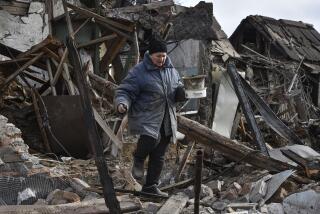CRISIS IN BOSNIA : Even as West Issues Threats, Russia Reassures Serbs : Alliance: The Kremlin goes its own way on the Balkans as it heeds geopolitical concerns and domestic support for fellow Slavs.
- Share via
MOSCOW — As British, French and U.S. diplomats warned Bosnian Serbs that the rebels were all but provoking massive NATO air strikes with their relentless attacks on U.N.-designated “safe areas,” Russian Foreign Minister Andrei V. Kozyrev flew this week to the Serbian capital, Belgrade, to calm fears of Western reprisals.
Bombing airfields and ammunition stores belonging to nationalist Serb forces in Bosnia-Herzegovina would only aggravate the conflict and risk a wider war, Kozyrev agreed with Serbian President Slobodan Milosevic during his two-day visit “to synchronize watches.”
While the three North Atlantic Treaty Organization members largely blame Milosevic for fanning ethnic hatreds and fomenting warfare in the Balkans, Kozyrev praised the Serbian strongman for pursuing “a policy of peace.”
Russia has long been out of step with the international community in its open support for the Belgrade regime, accused of masterminding the Balkan conflict in which at least 200,000 people--mostly Muslim civilians--have been killed.
And despite the rebel Serbs’ latest assaults on safe areas in Bosnia--actions that have spurred global condemnation--Moscow has stood by its Slav Orthodox allies in warning that punitive military action would do no good.
But analysts here contend that the Kremlin’s unwavering support for the Serbs has more to do with geopolitical strategy than with blind devotion to Slavic brotherhood, and Moscow’s attempt to exploit its influence in the volatile Balkan region is now drawing some fire at home.
“What we are seeing today in Russia’s foreign policy is an attempt--sometimes hesitant and clumsy--to carve its own image in world politics,” said Andrei V. Kortunov, deputy director of the USA-Canada Institute in Moscow.
Russia’s role in the Balkan conflict is also constrained, he noted, by the effect every action taken has in domestic nationalist circles. Mikhail N. Guboglo, an inter-ethnic relations specialist with the Russian Academy of Sciences, agreed that many of Moscow’s pronouncements and policies that appear supportive of the outcast Serbs are motivated by a desire to pander to rising nationalist sentiments inside Russia.
“The parties that were most successful in the December, 1993, parliamentary elections were those who successfully exploited the idea of a strong Russia defiantly defending its interests,” Guboglo said. “And as new elections approach, the parties in power are now stealing the successful slogans of those who won last time.”
Kozyrev, one of the leadership’s most vocal defenders of the Serbs, returned Tuesday from Belgrade declaring himself fully satisfied with Milosevic’s promises to pursue peace. He warned that militarily challenging the Bosnian Serbs would scuttle the U.N. peacekeeping mission, embolden the nearly vanquished Bosnian government forces and possibly spread the conflict throughout the Balkans.
Russian Prime Minister Viktor S. Chernomyrdin also weighed in Tuesday with his opinion that nothing will be resolved in the war-ravaged region except through “exclusively peaceful measures.”
Kozyrev renewed Russia’s appeal for a lifting of economic sanctions imposed on the rump Yugoslav federation as an inducement for Milosevic to recognize the prewar borders of Bosnia. Such recognition of Bosnia by Belgrade would likely do little to change the fait accompli of Bosnian Serb conquest and the “ethnic cleansing” of 70% of Bosnia.
But Milosevic, who stirred nationalist pride with a rallying cry for a Greater Serbia that would embrace all Serbs in the Balkans, was offered the same sanctions relief a year ago and declined to make the symbolic concession.
Although Milosevic has enlisted Russia’s backing in his campaign to ward off threatened NATO air strikes on his Bosnian Serb allies, some Russian analysts and politicians have lashed out at that support as de facto encouragement of Serbian aggression.
“The position of the Bosnian Serbs is unacceptable. It is bordering on ethno-fascism,” complained Viktor I. Borisyuk, deputy chief of Moscow’s Presidential Analytical Center. “That is why the West, NATO and the European Union are supporting the Muslims [the Bosnian government]. Their position is reasonable and understandable.”
Borisyuk speculated that Russian President Boris N. Yeltsin and his military advisers are as wary of deeper involvement in the Balkans as are Western nations and have been foot-dragging on the issue of air strikes in a common bid with other members of the five-nation Contact Group to escape military involvement in the conflict.
Independent media, such as the nightly newspaper Izvestia, have lately criticized the Kremlin for blocking more forceful intervention by NATO states to protect the six safe areas of Bosnia as the Bosnian Serbs have besieged them. Two of the havens, Srebrenica and Zepa, have succumbed to the heavily armed rebels this month, sending terrified women, children and elderly people fleeing for their lives. Thousands of fighting-age Muslim men rounded up by the Serbian conquerors are missing and feared victims of summary slaughter.
While the Kremlin leadership has held fast to its opposition to any forceful NATO intervention, it has embarked on symbolic gestures and pleas for peace--such as Tuesday’s effort to call in a “higher authority” to resolve the conflict. A cargo ferry to the Mir space station delivered two icons blessed by Pope John Paul II and Russian Orthodox Patriarch Alexi II, and the two cosmonauts aboard the Mir appealed from space for Balkan peace.
More to Read
Sign up for Essential California
The most important California stories and recommendations in your inbox every morning.
You may occasionally receive promotional content from the Los Angeles Times.














